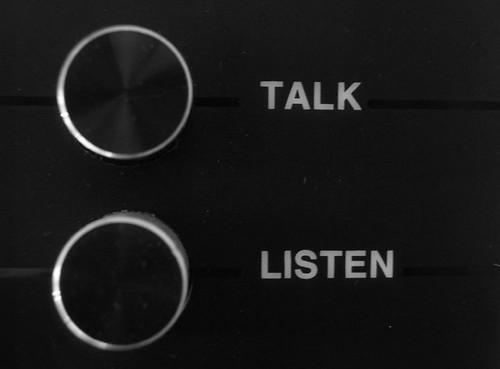An easy way to dramatically improve your listening skills:
.
The technique is called non-evaluative listening:
We can achieve real communication and avoid this evaluative tendency when we listen with understanding. This means seeing the expressed idea and attitude from the other person’s point of view, sensing how it feels to the person, achieving his or her frame of reference about the subject being discussed.
This may sound absurdly simple, but it is not. In fact, it is an extremely potent approach in psychotherapy. It is the most effective way we’ve found to alter a person’s basic personality structure and to improve the person’s relationships and communications with others. If I can listen to what a person can tell me and really understand how she hates her father or hates the company or hates conservatives, or if I can catch the essence of her fear of insanity or fear of nuclear bombs, I will be better able to help her alter those hatreds and fears and establish realistic and harmonious relationships with the people and situations that roused such emotions. We know from research that such empathic understanding—understanding with a person, not about her—is so effective that it can bring about significant changes in personality.
If you think that you listen well and yet have never seen such results, your listening probably has not been of the type I am describing. Here’s one way to test the quality of your understanding. The next time you get into an argument with your spouse, friend, or small group of friends, stop the discussion for a moment and suggest this rule: ‘‘Before each person speaks up, he or she must first restate the ideas and feelings of the previous speaker accurately and to that speaker’s satisfaction.’’
You see what this would mean. Before presenting your own point of view, you would first have to achieve the other speaker’s frame of reference. Sounds simple, doesn’t it? But if you try it, you will find it one of the most difficult things you have ever attempted to do. And even when you have been able to do it, your comments will have to be drastically revised. But you will also find that the emotion is dissipating—the differences are reduced, and those that remain are rational and understandable.
Source: “Barriers and Gateways to Communication” by Carl R. Rogers and F. J. Roethlisberger, Harvard Business Review, July-August 1952
Listen to what people say. Don’t interrupt, disagree or “evaluate.”
Then, without being awkward, repeat back the gist of what they just said, from their frame of reference.
They will feel like you really understand them and you probably will — because while they were speaking you haven’t been trying to figure out why they’re wrong or misguided. You’ve been trying to understand their perspective.
Join over 200,000 readers. Get a free weekly update via email here.
Related posts:
How To Stop Being Lazy And Get More Done – 5 Expert Tips
How To Get People To Like You: 7 Ways From An FBI Behavior Expert
New Harvard Research Reveals A Fun Way To Be More Successful




